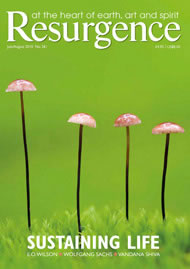Any book endorsed by Vandana Shiva has to be worth reading, and this one certainly is, not least for the array of examples of sustainability in operation around the world and the genuine optimism about the possibilities for change emanating from these two writers, both key members of the World Future Council.
Bianca Jagger, in her foreword, describes it as “ground-breaking” in its detail of how we can move from a carbon-driven economy towards a carbon-absorbing economy, from a disposable world to a renewable one. There has, of course, been much analysis about the former, but a great deal less has been written about how the latter, the renewable world, can come about at both individual and government levels.
This book, whilst still outlining some of the key climate-change and energy shortages facing us, concentrates on how to make the transition to a world that stabilises the Earth’s atmosphere at 350 carbon dioxide molecules per million, runs on renewable energy, renews local economies and urban habitats, creates equal opportunities, invigorates international cooperation and does not deplete natural capital. In doing this, the authors do not shrink from discussing difficult questions about nuclear power, biofuels, carbon taxes and carbon capture and storage (CCS), stressing that the facts are often unclear and the debate far from over.
However, the main theme of the book is not only to clearly define climate stabilisation as a fundamental necessity for long-term security, but also to see it as an opportunity for creating a more just and peaceful world. Tackling poverty is part of sustainable development. Ethics are as important as economics, and energy equality requires a new balance of energy consumption across the world.
International cooperation and inter-national policies will be required because a local-only strategy, though imperative, has no hope of reforming the global energy, food, trade and financial systems. But, even more important, there is too much at stake to leave it all to market forces or personal action. It is worth remembering that the Stern Report (2006) said that climate change represents the greatest market failure the world has seen.
The book is divided into clear, well-argued chapters but its strength lies in the examples it gives of current actions and policies. The Billion Tree programme in Kenya has been much heralded, as have the many examples of jobs being created by the green-collar economy. However, the book deals with more specific examples in some detail and a few can be mentioned here.
The first is at government level: Ecuador’s new radical constitution is the first in the world to extend “inalienable rights” to Nature, including the right to be free from exploitation and harmful environmental consequences – not bad for a country that opened its Amazon forest to oil companies thirty years ago in order to service its debts to US creditors and the International Monetary Fund.
In India, the Navdanya movement has pioneered the saving of seed with the active participation of the local communities, so that local farmers do not have to rely on the multinational seed companies. On a local level, the “bio energy village” of Jühnde in Germany shows that 100% of energy needs can be supplied by renewables: in this case, a 700kW biogas installation and a 550kW wood-chip heating plant providing electricity and heat for 140 households.
Spain’s first major solar station, near Seville, consists of a 90-metre-high tower surrounded by 624 mirrors and will supply enough energy for 60,000 homes. In the UK, the town of Lewes (one of some 200 Transition Towns in the UK) is attempting to rebuild its once-vibrant web of local businesses and traders.
The authors conclude that the concept of ‘a renewable world’ is still in the making and that they have only defined some of the key steps that we all need to take. However, action is needed quickly, and maybe the current global financial climate will help as it forces people to rethink values and lifestyles. This is certainly a timely book that explores many emerging ideas and solutions to the huge problem of climate change.







